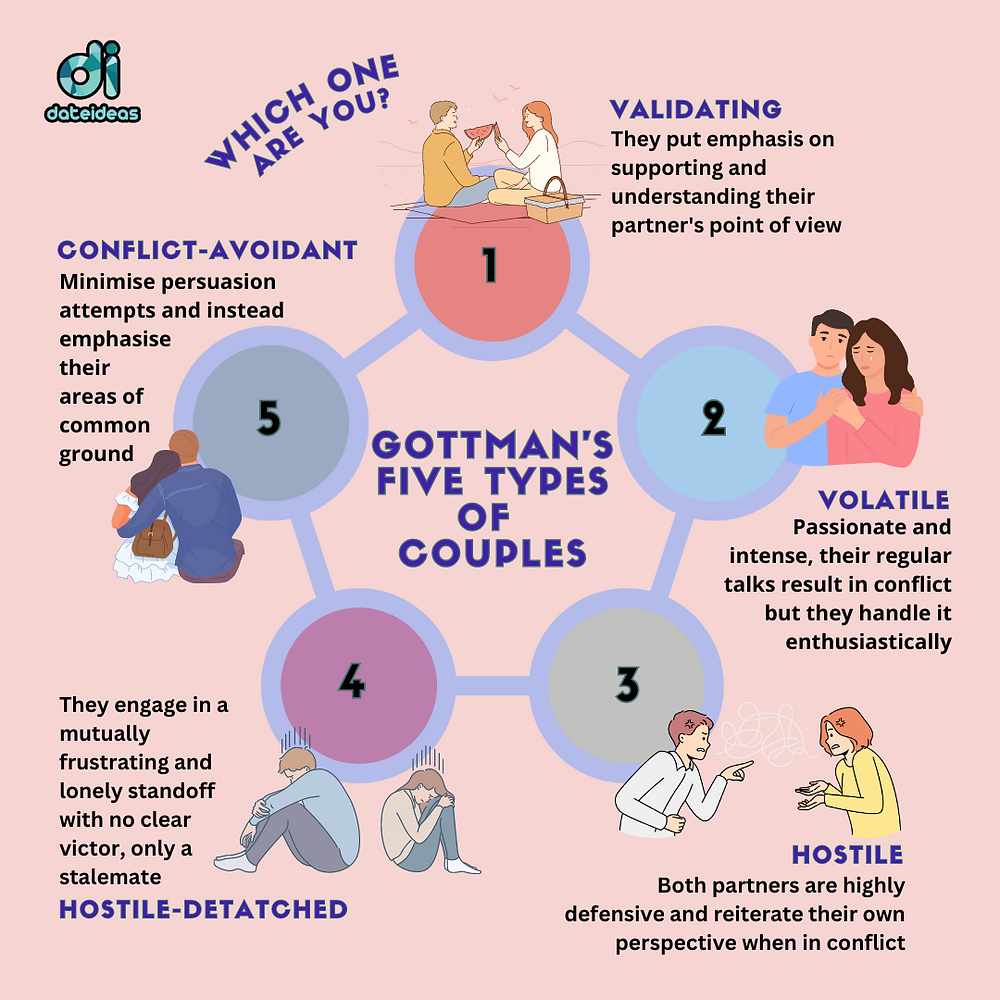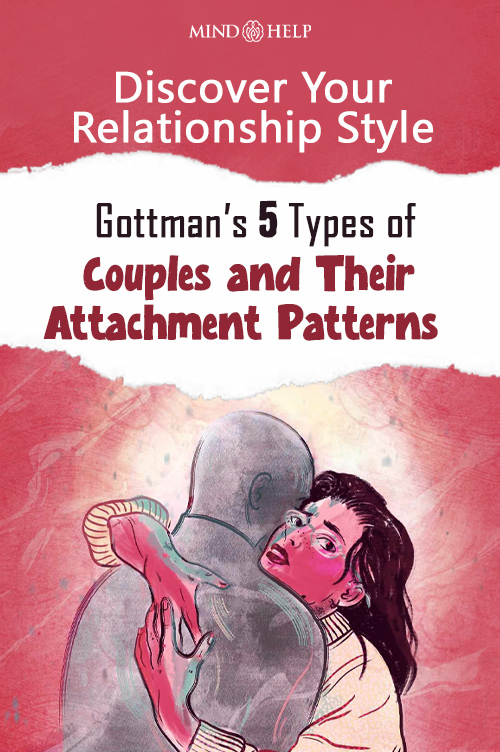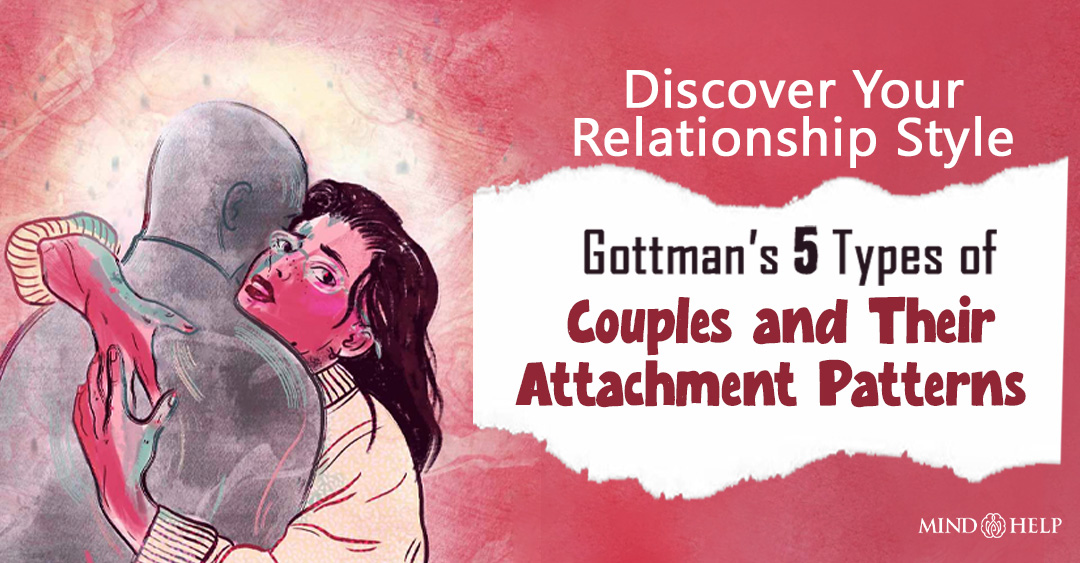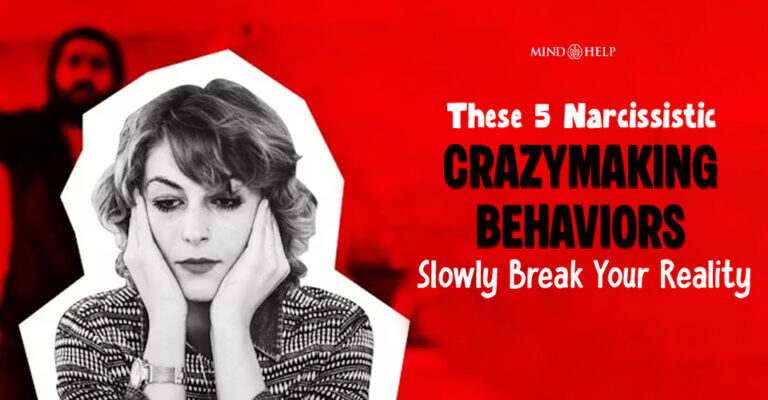Ever notice how some couples glide through life like a perfectly synced duo finishing each other’s thoughts, cracking up at the same jokes, and tag-teaming challenges with ease, while other types of couples seem caught in a loop of miscommunication?
That’s where Dr John Gottman, often affectionately called the “Einstein of relationships,” steps in. After studying thousands of partners, he uncovered why some pairs master the rhythm of love while others feel like they’re playing emotional whack-a-mole.
Understanding your relationship style isn’t just interesting; it can help you strengthen your bond, handle tough moments with grace, and keep your spark alive. So buckle up: we’re exploring Gottman’s five distinct types of couples and the attachment styles that shape them.
Gottman’s 5 Types of Couples
Below are the five core patterns Gottman identified, each linked to different attachment styles in relationships:
1. Conflict-Avoiding Couples: Calm on the Surface, Complicated Underneath
These couples are like a serene lake—you only notice the stillness until you take a deeper look. Conflict-avoiding partners prioritize harmony and tend to skate around sensitive topics. Instead of trying to persuade or challenge, they lean heavily on common ground.
At first glance, this dynamic seems dreamy: no yelling, no heated disputes, no emotional explosions. But beneath the quiet surface, unresolved concerns often pile up. When important issues—like finances, unmet emotional needs, or parenting differences—surface, conflict-avoidant couples may feel unequipped to address them.
Their strength: They create a gentle, peaceful environment where neither partner feels overwhelmed.
Their challenge: Learning to face conflict without seeing it as dangerous.
With intentional communication and a bit of courage, this relationship style can balance calm with honesty.
Read: The Truth About Silence in Relationships: 3 Hidden Types You Must Know
2. Volatile Couples: Passionate, Fiery, and Emotionally Alive
If you’ve ever watched two people argue intensely one moment and laugh together the next, you’ve likely encountered a volatile couple. This is one of the most expressive types of couples, marked by high energy, deep passion, and animated disagreements.
These partners don’t hold back. Whether they’re expressing affection or frustration, everything comes out with intensity. But what truly defines this relationship style is their remarkable ability to reconnect quickly after conflict. They fight hard but love hard, too.
The risk: Without empathy and boundaries, big emotions can leave lasting bruises. Healthy tools like “cool-down signals” or agreed-upon pause phrases can keep the flames from turning destructive.

3. Validating Couples: Where Communication Feels Like Connection
If conflict-avoiding couples keep things calm and volatile couples keep things fiery, validating couples fall right in the middle. They communicate with warmth, patience, and a genuine desire to understand each other.
Contrary to what you might think, validating couples don’t dodge disagreements. They simply handle them with a balance of reason and emotion. When issues arise, both partners slow down, listen well, and collaborate on a solution.
According to Gottman, this is the most stable of the attachment styles in relationships, largely because it nurtures emotional safety and mutual respect. When partners stay curious, playful, and open, this relationship style naturally supports long-term intimacy and satisfaction.
4. Hostile Couples: When Conflict Turns Into Combat
Some couples don’t fight the problem, they fight each other. If a relationship is caught in patterns of criticism, contempt, defensiveness, or sarcasm, it likely fits this category.
Arguments become frequent and painful. Words sting. Trust erodes. Silence becomes colder than the shouting. Over time, partners in hostile relationships can feel deeply lonely—even when they’re in the same room.
Hostility is the biggest predictor of relationship failure, but it’s not a dead end. When both partners become aware of their attachment styles and commit to healthier communication, the dynamic can shift.
The key: Moving from attack to understanding.
Read: 5 Ways To Be A Better Listener In Your Relationship(And Make Your Partner Feel Heard!)
5. Hostile-Detached Couples: When Partners Drift Into Separate Worlds
Then there are couples who share a home but not an emotional world. Hostile-detached partners aren’t loudly fighting—they’re quietly disconnecting. Arguments still occur, but they lack energy, intention, or care.
Communication becomes strictly practical: chores, bills, schedules. Meanwhile, emotional closeness fades into the background. Gottman considers this the most at-risk of all the types of couples, because the relationship doesn’t implode—it quietly dissolves.
The hopeful news? Even frozen connections can thaw. Small acts of warmth, shared moments of humor, and guided support like couples therapy can slowly rebuild emotional intimacy.

Final Thoughts: Navigating Love With Awareness and Heart
Here’s the beautiful thing about relationships: they don’t have to be flawless to thrive. They’re living stories filled with breathtaking highs and challenging lows. Gottman’s five types of couples offer a compassionate roadmap for understanding your patterns and strengthening your bond.
When you explore how your attachment styles, communication habits, and relationship style influence the way you connect, you gain the power to reshape your story.
Understanding your dynamic isn’t about judging yourself. It’s about recognising what nourishes your connection and what drains it. And remember—your relationship is a work in progress, not a finished product.
So, write a story together that feels safe, connected, and beautifully yours.
Frequently Asked Questions (FAQs)
What are the different types of couples?
Gottman identifies five main couple types: Validating couples who prioritise empathy and calm communication, Volatile couples who argue passionately but stay emotionally connected, Conflict-avoiding couples who keep the peace by sidestepping issues, Hostile couples marked by criticism and tension, and Hostile-Detached couples who argue coldly and withdraw emotionally.
What is the 7 7 7 rule for couples?
The 7-7-7 rule encourages couples to keep their connection alive through intentional quality time: go on a date every 7 days, take a night away every 7 weeks, and plan a longer getaway every 7 months. It helps partners reconnect regularly, break routine, and keep romance, fun, and communication strong in the relationship.
What are the red flags in Gottman’s relationship?
Gottman highlights key red flags called the Four Horsemen: criticism, which attacks a partner’s character; contempt, expressed through mockery or disrespect; defensiveness, where partners avoid responsibility; and stonewalling, shutting down or withdrawing during conflict. These patterns weaken emotional connection, escalate arguments, and, if repeated, can significantly damage the stability and future of a relationship.








